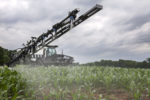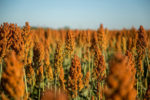Advertise Follow Us
Items Tagged with 'Kansas State University'
ARTICLES
Grazing Cover Crops Helps Dryland Soil Health
K-State researchers have found that grazing cover crops can improve soil health in no-till dryland cropping systems, addressing a key concern for producers in water-limited environments like the central Great Plains.
Read More
Treat Soil Samples Right for More Accurate Fertilizer Prescriptions
Studies show storage of soil samples & sample bag type affect soil health test results
Read More











